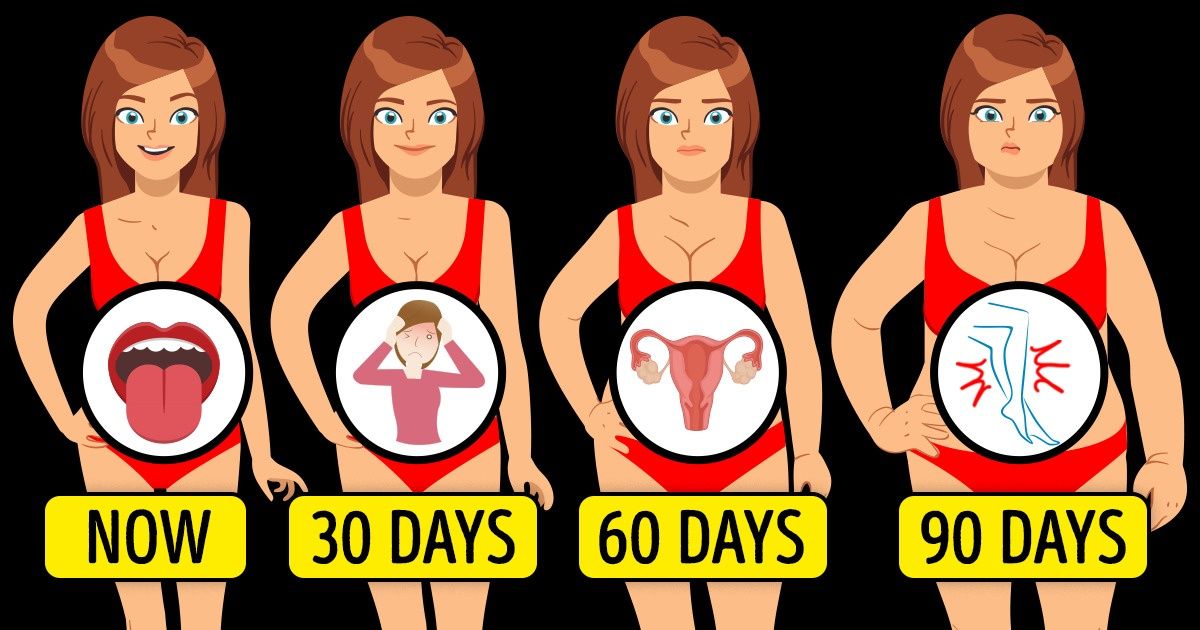I Cut Off My Parents After They Demanded My Inheritance—and I Don’t Regret It


Extra pounds have bigger impact on your body than just making you weight more. Gaining some weight over a year might seem innocent, but new pounds can add up over time and have serious consequences. The taste of food becomes dull for overweight people, they are more likely to feel depressed and anxious, and have short- and long-term health problems with breathing, conceiving, and with their heart.
Bright Side wants to draw your attention to the importance of living healthy and prepared a list of 14 consequences of being overweight.
It might seem that we gain weight because the food we eat appears too tasty, but that’s not true. Studies prove that obesity reduces our taste receptors by 25%. This makes people consume even more food as they try to experience the same rich taste they had before from their favorite meals.
Weight gain raises your chances of getting a sudden headache. According to the American Migraine Foundation, people with obesity suffer from chronic migraines more often than others. Important: Obesity does not cause migraines, but it’s a risk factor, which means being obese makes it more likely you will have migraine.
Your body needs cholesterol to build healthy cells, but high levels of cholesterol can increase your risk of heart disease. Weight gain makes your body develop high cholesterol and raises the risk of having fatty deposits in your blood vessels. Fatty deposits make it difficult for your blood to flow through your arteries, prevent your heart from having enough oxygen, and decrease blood flow to your brain. This increases the risk of a heart attack and stroke.
There is a strong connection between depression and weight gain, according to research. Gaining weight has a psychological impact and this causes depression, especially among women. Another study says that overweight people have a 55 percent greater risk for developing depression during their life than other people.
One of the most dangerous consequences of gaining extra pounds for a woman is an increased risk of infertility. Extra adipose tissue leads to a hormonal imbalance. This affects the menstrual cycle of a woman and the quality of her eggs. As a result, it becomes harder for a woman to conceive.
Weight gain leads to vitamin D deficiency, an important nutrient that helps the body absorb calcium and promote bone growth, helps treat autoimmune diseases, cancer, and chronic pain, and fights depression. People with vitamin D deficiency experience muscle pain in multiple locations. You might think you get enough vitamin D through supplements and sunlight, but it can get diluted in the extra fatty tissue.
We might think that when we gain weight, it is deposited in just some areas of our body, but it gets distributed throughout the whole body instead. It also appears near the throat and neck area and it leads to the narrowing of the air passage. As a result, a person starts snoring really loud.
Though our genes don’t change throughout our lives, our lifestyle can influence them, according to Helmholtz Zentrum Muenchen. Gaining weight can change our DNA and it might have more dangerous consequences than it seems. This change leads to an increased risk of type 2 diabetes, both for parents and for their children.
If you’ve noticed that you have started going to the toilet more than usual, you might need to pay attention to it. This can be a sign of kidney disease and could be caused by the extra pounds you’ve gained. Obese and mildly overweight people are 7 times more likely to have kidney problems and even kidney failure, according to research done by the University of California — San Francisco.
Extra weight can cause you to stop breathing when you sleep — it’s called sleep apnea. It occurs when the upper airway gets blocked during sleep and the airflow gets reduced or even completely stopped. The brain sends a signal to wake up and this constant awakening can make you lose sleep — which could lead to more weight gain.
When you exceed your daily calorie limit and eat too much, carbohydrate and fat molecules are being converted into fat by your liver. Consuming extra calories causes your body fat stores to expand and, as a result, you gain weight again. To lose the excess calories that your body has stored, you need to create a “calorie deficit.”
Weight gain doesn’t guarantee you will develop cancer, but it does seriously increase the risk, according to studies. Poor diet, smoking, and drinking alcohol also increase your cancer risk and put you in danger. If you are looking for a better option to transform yourself, start with something simple — cut out added sugars and alcohol and try to smoke less.
Another thing that weight gain does to your body is that it puts extra stress on your heart and leads to high blood pressure. This increases the risk of having a stroke or developing dementia. Moreover, excess weight puts you at risk of developing diabetes. An overweight body uses insulin in a way that it’s not naturally intended to be used. Untreated high blood sugar is very dangerous and can be fatal in some cases.
Many things can cause anxiety, but according to a new study, the chances of developing anxiety can be increased by the amount of excess fat in the body. Researchers noticed that overweight women suffered from anxiety more than their slimmer peers. As they lost weight, the symptoms of anxiety got reduced and women started feeling better. This loss of weight could alter brain chemistry and make it produce serotonin, known as the “hormone of happiness.”
Though the most obvious reasons for weight gain can be eating too much and not being very active, there are a couple of other factors. Hormone imbalances, some medications, and thyroid issues can also have an influence on your body and make you gain unwanted weight.
If you think you have any of the problems mentioned in this article, you should consult your doctor and they will help you to take the proper first step to solving them.
Have you gained some extra pounds during the holiday period? Have you noticed any of the things mentioned in this article happening to your body? What are your methods for losing weight? Share with us in the comment section!











